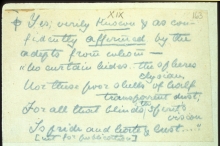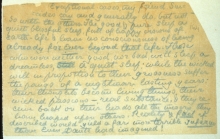Attached to Proofs of Letter on Theosophy. Received August 12th, 1882.
Письмо №71
Письмо №71 (ML-19)
Махатма К.Х. - А.П. Синнетт
12 Августа, 1882
Титульных листов - 1. Страниц - 2.
Страница 2
Exceptional cases, my friend. Suicides can and generally do, but not so with the others. The good and pure sleep a quiet blissful sleep, full of happy visions of earth-life and have no consciousness of being already for ever beyond that life. Those who were neither good nor bad, will sleep a dreamless, still a quiet sleep; while the wicked will in proportion to their grossness suffer the pangs of a nightmare lasting years: their thoughts become living things, their wicked passions — real substance, and they receive back on their heads all the misery they have heaped upon others. Reality and fact if described would yield a far more terrible Inferno than even Dante had imagined!
Inferno (Italian for "Hell") is the first part of Dante Alighieri's 14th-century epic poem Divine Comedy.





This verse is a modified version of the original, appearing in the poem "A Hymn from the Inner Life" by Spiritualist Thomas Lake Harris, published in 1848.
Non-verbatim versions of the verse were later published, unattributed, by Randolph in his book Seership (1870), and by Henry Kiddle in his book Spiritual Communications (1879).